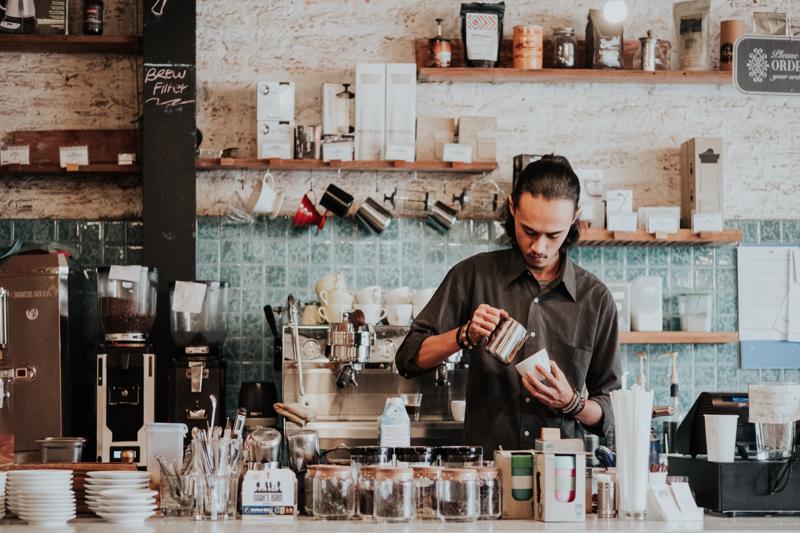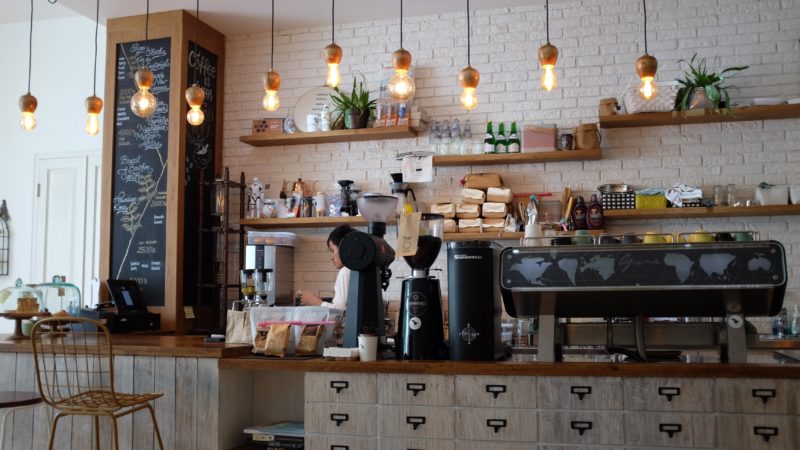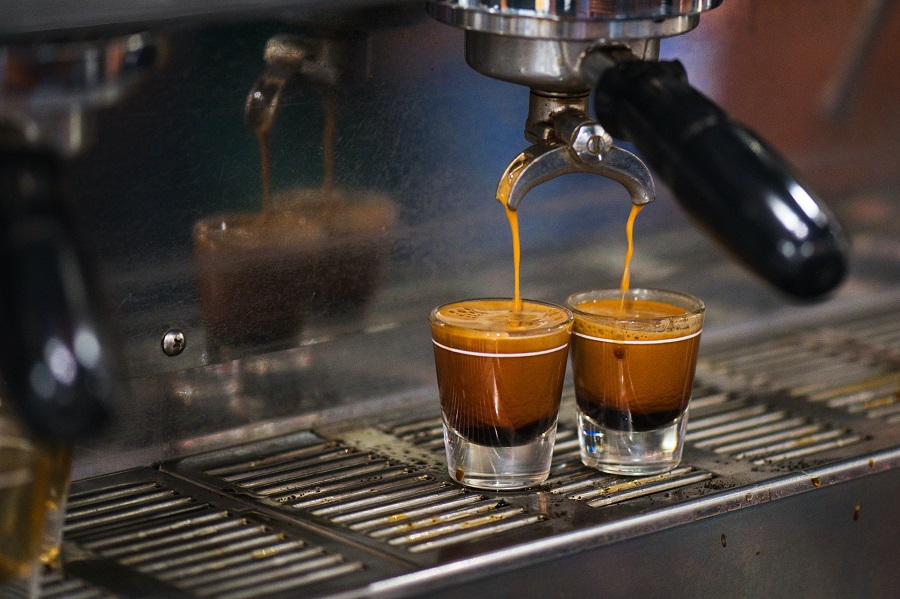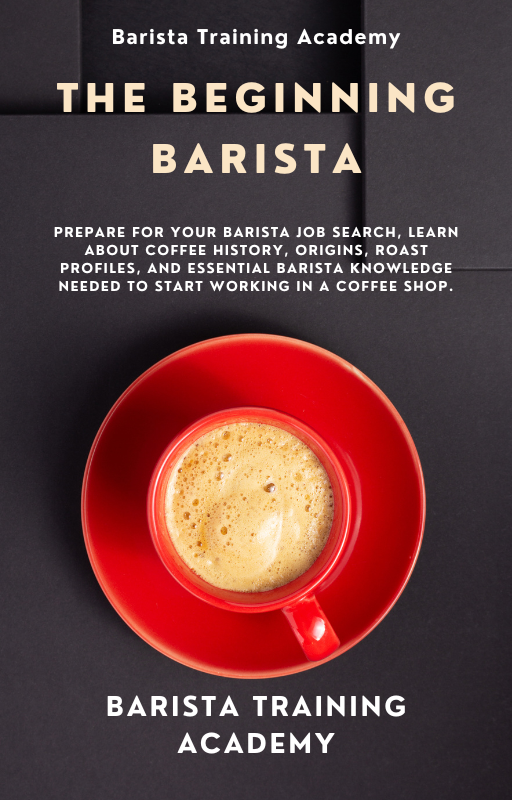What are Barista Duties?
A barista is commonly referred to as someone who makes and serves espresso coffee, usually at a café or coffee shop. Baristas work on developing their barista skills at making a variety of coffees, including Americanos, Café Lattes, Macchiatos, Breves, and Cappuccinos. Before you actually work in a coffee shop, consider getting barista training.
Not only do baristas make coffee, but they do several other things too, including ring up the cash register and take in money transactions of the customers that they are serving. Additionally, baristas may also serve tea, wine, beer, and other beverages and serve food, baked goods, and other items.
A barista doesn't only make and serve coffee and other items. Their real specialty is customer service. Excellent customer service skills while serving a variety of customers is essential for success as a barista.

How much do baristas make?
It is common for baristas to make minimum wage or near minimum wage, plus tips. Some customers can tip very well, resulting in a great hourly wage for baristas. This is especially true if a barista works in a bustling café or coffee shop where they serve up to 20-40 patrons per hour. Many patrons usually tip $1 for each coffee order. In the United States, about 70-80% of customers tip at a non-Starbucks location. Sometimes if a patron has established a real professional friendship with the barista, the patron can be tipped $5 per order! Multiply your average tip of, say, $1 per order by the number of patrons, and you can figure out your hourly wage.
The term “barista” has been made popular by Starbucks who called their “coffee espresso makers” baristas beginning in the late 1980s. Many people have loosely used the term, but true baristas all have one thing in common: a deep passion for coffee. Baristas are coffee professionals. They understand coffee and its chemistry, understand coffee and how it should be served, and understand great customer service.
Baristas are important to a community. Their skills and service are important assets to a business and the people they serve.
How Do I Become a Barista?
There are many different ways to become a barista. While some barista has been formally trained, mostly baristas learn the ropes by “doing it.” Many cafes and coffee shops require some barista experience, but it is not really necessary as long as you get the training somewhere. In fact, it’s pretty customary that a café requires anywhere from 1-3 years of experience at a busy coffee shop.
So the question then becomes, how do I get barista experience if everyone first requires experience?
This is a common and excellent question for those who want to be a barista. First, if you have no experience, there are several ways to get your foot in the door and start training as a barista.
Remember, there is no “right way” to become a barista except by just “doing it.” I first started as a barista when I decided to get our first espresso machine instead of serving drip coffee. The espresso machine maker sent a trainer to train several of us, and I ran with it!
So, this leads me back to answering the question, “How do I get barista experience if many coffee shops require at least some experience before starting?”
Here is the thing: Most coffee shop owners would rather have someone dependable, friendly, and willing to learn about serving coffee than with someone who actually has experience as a barista.
What Experience is Relevant to Become a Barista?
However, it is always helpful to get some barista training or barista experience.
The truth is competition for barista positions is often tough – the flexible schedule, social aspects of the job, and the potential to make up to $30 to $40 an hour make each barista shift competitive in some coffee businesses.
While you might not have any direct barista experience, what coffee shop owners may look for in applicants is your customer service experience – specifically restaurant service. This would include “serving” or “waiting tables” and/or hosting. The more experience you have in serving food – or dealing directly with your customers is important and highly sought after. Additionally, any other experience that may include restaurant management or “Staff Lead” where you are managing a staff of employees is important.
“Hosting” requires meeting and greeting new customers, seating them in their seats according to the number of their party, and even assigning tables with the wait staff or “servers.” While it may seem like an easy job, it requires organizational skills and exceptional customer service skills. When things get busy at your café or restaurant, the “hosting staff” are often called upon to fill in.
Since café owners are looking for people who will be comfortable and proactive with inventory management, managing inventory is also valuable.

What is Inventory Management?
Effectively managing the inflow and outflow of supplies and products so that your business does not run out of needed supplies may impede sales and profits or slow or stop the regular flow of business. Proper inventory management can either “make or break” a business. Having too much inventory can cost businesses plenty of money (and tie up a lot of money, too!). Additionally, having too little inventory can cost business by not allowing the proper products to sale.
For example, too many coffee lids and not enough coffee cups may obviously hurt business. Running out of cups can cause you to close shut down and close early for the day and hurt sales. Having too many lids may cost your business extra money. Fortunately, having too many non-perishable items like lids can provide a little inconvenience without too much money wasted. However, when you move over to perishable items like muffins, chocolate, and baked goods may force a business to lose tons of profits on a day-to-day basis.
Inventory management requires the skill of knowing what supplies you need for the business to operate daily. Therefore, if you have a bit of inventory knowledge and even some accounting skills, it is always helpful for business owners or cafes.
Inventory management is, therefore, an important skill that many café or coffee shop owners have. Even if you do not work directly with inventory, hiring a qualified and skilled barista with knowledge of such items makes for a promising chance at getting hired.
Getting Hired as a Barista
Getting hired as a barista may be challenging without any expertise, but it is not impossible!
If you don’t have barista experience, you can still apply for a barista position with other job experience types. These include waiting experience, sometimes called “serving” and/hosting experiencing. Additional experience that can lead to a hosting position includes hotel and restaurant experience, cooking experience, baking experience, and inventory/accounting experience.
A Passion For The Bean
Yes, that’s right, the number one factor that makes a great barista (either inexperienced or veterans) is a true passion for the bean. The best barista training starts with learning about the coffee bean. Coffee is complex. In fact, it’s more complicated than wine at a molecular level. It has over a thousand different flavonoids, which can impact the ultimate taste. Add it to various roasting techniques, and you have literally got an unlimited amount of tasting opportunities.
Even if you don’t have any experience as a barista, a wait staff member, a host, a cook, or anything in between, having a passion for coffee is ultimately required.

Barista Job Information
Finding a barista job in your city or neighborhood may be a challenge. However, by visiting your local cafes and places you would want to work, you’ll find available positions open as they become available.
Many barista positions are heard of by “word of mouth,” meaning many people find their job by hearing it from a friend or a “friend of a friend.”
Other cafes and businesses often create a job listing on Craigslist. Craigslist can, in fact, be a good way to see if there are available barista job openings. However, Craigslist has some recent problems when it comes to safety, so we highly recommend using extreme caution when it comes to answering posts. In fact, bring a friend with you to the interview and always let someone know where you are going.
Creating a “Google Alert” can be a great way to see if any job postings have been made available. An alert emails you when something is published on the web and indexed by Google. Creating a Google Alert is pretty easy, but it requires you to have a Gmail account. Once you create your Gmail account, you can go into your Product Settings and “create an alert.”
You can create an alert with the following words, “Your City, Barista Job.” So, for example, if you live in Cleveland, Ohio, you will create an alert for “Cleveland Barista Job.” It would help if you also had several options of when you will receive your alerts. For example, you may be notified daily, weekly, or “as they happen.” This will provide you with the most recent information online.

Barista Required Skills
Many people interested in being a barista want to know the required skills for the position. As a barista, you will need to know the following skills:
- Working on an espresso machine (the more, the better)
- Full knowledge of the variety of coffee drinks and what they consist of
- Basic math skills for ringing up the register
- Customer service skills
- Organizational skills
We will talk about each individually at first.
Espresso Machine Knowledge
There are a variety of espresso machines that are commonly used in cafes and coffee shops. La Marzocco, Synesso, and Slayer are a few. All of them have similar functions in that extracting coffee comes from heat and pressure. A shot of coffee really means one “shot glass” off coffee. Espresso machines are divided into “groups” where the coffee is extracted/poured from – for example, it’s common to see two- or three-group espresso machines. This means the one espresso machine can have three group heads. Since many cafes have different machines, general working knowledge is beneficial to start with. The best way to do “pull shots” is by doing it.
Know Your Coffee Drinks
What’s the difference between a Breve and an Americano? What about a macchiato and a pour-over? Since big chains like Starbucks have their own drinks (which many customers then visit other cafes and expect to have), you may have to be at least familiar with what others are serving – even though you don’t serve those drinks at your location.
The truth is that if you have 10 people standing in line for one of your espresso drinks, the chances are that they will ask you to make at least seven different types of drinks by the time your line is empty! Sound stressful? It can be if you are unfamiliar with your espresso machine and your espresso drinks!
Basic Math Skills
If you’re still in school, taking math classes can be important. Solving analytical problems like math can help you add, subtract, and multiply all on the fly – and while you are talking to customers! Remember, you’ll be dealing with discounts, taxes, refunds, etc., all while figuring out what the next person in line wants to drink. Sure, you can depend on the cash register or software program, but you still have been able to think about what you’re doing – in an analytical way!
Basic math skills are important for everyone who works behind the register. Your job at the register (taking in money correctly and giving out the right amount of change) can make or break your café’s bottom line. While many café owners fail to ask this question, “Are you good at math?” it will be clear when it’s your time to ring up a large line of customers on a busy day.
Think that this doesn’t hurt your pocketbook? Some owners require their employees to make up for lost money during the day out of their own pocket. So, for example, at the end of your shift, you are short $12.39 – that could come out of your wages. This practice is legal in some states. The bottom line is that nobody wins when you cannot do the math.
Customer Service Skills
Nearly every house in America has some coffee in it – especially when we’re talking about houses occupied by coffee drinkers. So, why would anyone go and pay $3 to $6 for one cup of coffee when they can brew decent coffee at home?
Well, survey after survey suggests that many coffee drinkers who have the option of drinking coffee at home actually go across the street to a café for a couple of distinct reasons:
- Specialty espresso drinks
- Great customer service
Customer Service Matters
Yes, people come to coffee shops for coffee that they can’t make at home (i.e., espresso machine drinks). And they also come to get great customer service. They are really paying for the interaction with you. People want to start their day out with a friendly face – a smile, a joke, or someone to remember your name.
In fact, when choosing between two coffee shops:
- With Great Service & Okay Coffee
- Horrible Service & Great Coffee
Guess which one most customers will choose? Which one would you choose – REALLY?
Which one would you want your grandmother to go to?
We bet all of the answers would be the first choice. If you chose the first choice, you would join 95% of the customers who would also choose.
The bottom line is that customer service matters. Doing your best matters.
Get the Best Barista Training Online
If you are closer to coffee hubs like Seattle, Portland, and San Francisco on the West Coast or Chicago, New York, and Washington D.C., you might find various small barista training schools.
There are several ways to get training. You can refer to your individual state page here. You can also start at a coffee shop and starts “hands-on” training. Either way, there is plenty to know about coffee, so the sooner you start, the better.

Brought to you by Barista Training Academy, “The Beginning Barista,” Your Ultimate Prep Guide to Getting Your First Job as a Barista” is an ultimate resource that is available online and is affordable for anybody who is looking to start a career in the coffee industry. For more information, visit our blog.
